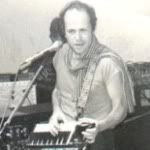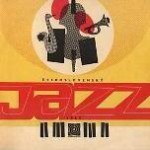Happy May, music nerds! Please give a warm music nerd welcome to guest contributor, my friend and fellow music nerd Ed Tracey! Ed is an aficionado of jazz, Motown, and other American music genres. Today he brings us this fascinating story about a long-time DJ and Jazz advocate who had an international impact! ~MMN
 While the Soviet Union’s empire fell due to a multitude of reasons, I’ll bet that one you never considered was… the work of an American radio DJ.
While the Soviet Union’s empire fell due to a multitude of reasons, I’ll bet that one you never considered was… the work of an American radio DJ.
For those of us who grew up in the rock’n’roll era: that music was quite feared by the authorities. But to an earlier generation, jazz was the threat (particularly to totalitarian governments around the world). And perhaps no single person brought the sound of this threatening music to more people around the world than Willis Conover – via his one-hour “Jazz Hour” program over the Voice of America (VOA) program from 1955 until his death in May 1996, fifteen years ago this month. And he is now the focus of a campaign to be awarded a posthumous Presidential Medal of Freedom.
Yet he is someone (for a very particular reason) whose name is unknown to most native-born Americans. Let’s begin to rectify this situation.
A Buffalo, New York native, Willis Conover (born in 1920) was an Army brat who had an interest in science fiction, and even edited the Science Fantasy Correspondent – a 1937 fanzine of its day. He had contact with the science fiction writer H.P. Lovecraft near the end of his life – not only did Lovecraft agree to an interview, he supplied Willis with out-of-print poems and short stories – and their correspondence was published in the book Lovecraft at Last in 1975.
Conover had a sonorous baritone voice that sounded great when he took part in a high school spelling bee broadcast on the radio – he was told by the announcer that this was the field for him. And so he began at a very small station in Maryland, and his experience talking to people over the airwaves resulted in (after being drafted into WW-II) a stateside task interviewing new soldiers at Fort Meade, Maryland. While at a USO canteen near the White House, he convinced its organizers to ditch the André Kostelanetz records they were playing in favor of works by the Dorsey Brothers and Artie Shaw. The audience reaction was so positive that one of the hostesses introduced Conover to her radio-station manager husband – and after the war, he was hired as a DJ at a major station in Washington, D.C.
Over the years, Willis Conover became more and more involved in the business of jazz: organizing many live concerts (and his insistence on not allowing segregation helped topple the District of Columbia’s Jim Crow system) as well as producing performances for radio (and later TV). Knowing many of the premier musicians, he was able to work well with them, producing shows at the Kennedy Center in Washington and – years later – organizing the White House performance of Duke Ellington in 1969 (for his 70th birthday).
But back in the 1950’s, Conover was tired of the increasingly restricted format of commercial radio (some things never change, huh?) and longed for a more free-flowing format. In 1955, his big break came: the Voice of America wanted to start a one-hour (commercial-free) jazz program, and he was hired for the job. And since the VOA is legally prohibited to be broadcast in the US (because it reflects the general intentions of the US government) Conover had a potentially new, world-wide audience who would be more accepting of a wide-ranging format – not following old, established patterns – which is just what he had hoped for.
Yet at the time, there were “immediate grumblings in Congress about wasting taxpayers’ money by broadcasting frivolous music.”
Part of the problem was the aforementioned prohibition on the VOA broadcasting within the US (unless one has a short-wave radio) … since legislators could not hear the shows, how could they assess its effectiveness? By the way, that restriction on domestic broadcast was put into place after WW-II because…
…Congress feared the State Department – full of “loafers, incompetents” …and “men of strong Soviet leaning” could… undermine the US Government.
It took the effort of diplomats such as Charles Bohlen – then our ambassador to the Soviet Union – in order to secure the funding for this program.
And Willis Conover was able to achieve world-wide stardom by merely presenting American music to the rest of the world. He had that perfect radio voice, as was already mentioned. In addition, he learned to speak what was referred to as Special English – slowly, and to enunciate quite clearly – not only for the benefit of those who did not speak English, but also for those listening on short-wave and poor transistor radios. And that was one aspect of his programs that listeners recalled decades later (along with his using Duke Ellington’s Take the A Train as his opening theme).
As mentioned, jazz was seen as a decadent music (in no small part to the major presence of African-American and Jewish performers) in totalitarian nations. This was the basis of the 1993 film Swing Kids – where swing music became an “underground movement of young people” in Nazi Germany. Not to be outdone, Josef Stalin had banned the playing of the saxophone – referring to it as “a dangerous capitalist instrument” – and while the ban began to fade after his death in 1953… the operative word is “began”. As late as 1970, the Cuban trumpeter Arturo Sandoval – as a 21 year-old in compulsory military service – was jailed for four months for listening to Willis Conover’s show (Sandoval got his revenge by defecting to the West twenty years later).
At his peak, Willis Conover’s show was estimated to have reached 100 million world-wide – all broadcast from a cramped studio in Washington, D.C. And 30 million of that total was in Eastern Europe alone – especially at a time when the VOA (as well as jazz music) was banned in many Eastern European countries.
Arriving on an airplane in one such country in 1959 (four years after that nation actually ended its prohibition of the VOA) he was baffled to see people gathering around his plane ….. then saw a large sign that read, “Welcome to Poland, Mister Conover.” On a trip to Moscow, a cab driver recognized him simply by his voice, and he was especially popular in the Soviet Union where the VOA was secretly listened to for information (as well as music).
Supplementing the work that Conover did in spreading the sound of jazz: the US State Department took the advice of Harlem congressman Adam Clayton Powell Jr. not to continue sending symphony orchestras and ballet companies overseas (which would merely be competing against the best of what Europe had to offer) and instead to send an art form that the Soviets couldn’t match. A cartoon in a 1958 issue of The New Yorker showed some officials sitting around a table in Washington, one of them saying: “This is a diplomatic mission of the utmost delicacy. The question is, who’s the best man for it — John Foster Dulles or Satchmo (Louis Armstrong)?” One such tour led by trumpeter Dizzy Gillespie had its last stop in Athens, Greece:
…where students had recently stoned the local headquarters of the United States Information Service in protest of Washington’s support for Greece’s right-wing dictatorship. Yet many of those same students greeted Gillespie with cheers, lifting him on their shoulders, throwing their jackets in the air and shouting: “Dizzy! Dizzy!”
Years later, many artists and musicians cited Willis Conover’s program. The poet Joseph Brodsky wrote that in wrote that, in listening to his shows, “the joints of highly inhibited Russian frames harkened to ‘swing’ music”.
In 2007, the Voice of America featured a tribute concert – with five veteran musicians whose careers were launched by listening to Willis Conover – Paquito D’Rivera on saxophones (Cuba), Milcho Leviev on piano (Bulgaria), George Mraz on bass (Czech Republic), Valery Ponomarev on trumpet (Russia), and Horacio Hernandez on drums (Cuba).
Now admittedly, those aren’t names that non-jazz fans may recognize. But one that you might recognize is the multi-keyboardist Jan Hammer – whose 63rd birthday was this past April 17th. His work includes a stint in the pioneering early 1970’s jazz-rock band Mahavishnu Orchestra and he has worked with many of the top musicians in all musical fields (in rock, for example: with Mick Jagger, Carlos Santana and most often with Jeff Beck – see the 2nd photo, at a Les Paul birthday tribute). And he is perhaps best known for his film scores as well as the music for Miami Vice – including “Crockett’s Theme” and the main theme song – for which he won two Grammy Awards in 1985.
Purely on a hunch, I contacted his manager, asking if the Czech Republic native had listened to Willis Conover… and received a prompt and courteous reply, saying that “if wasn’t for the VOA and especially Willis Conover’s Jazz Hour (Jan) may not have been who he is today.”


Another reason for Conover’s popularity was that he not only spun records: he also conducted numerous on-air interviews with the musicians whose music he showcased (him with Sarah Vaughn, 2nd photo) and one he conducted in 1973 with Duke Ellington was one of Duke’s last before his death the next year. And so these musicians (especially those who performed only instrumental music) … now became real human beings in his listener’s ears.
One blogger from India posted some radio links and received several replies: including one who listened to Conover via transistor radio back in the old country during the 1960’s. He also received replies from residents of the UK and Ecuador; others received replies from South Africa and Japan – this was a program whose appeal was not limited to the totalitarian countries, by any means.
And so when in reading about the Cold War … well, the Armenian-born pianist David Azarian once told DownBeat magazine, “When you are in a jail, that music makes you wonder what kind of country produced it. I tell you, Conover was America’s best weapon to destroy Communism.” And the Canadian music writer Gene Lees – whose English lyrics made a hit out of the Antonio Carlos Jobim song Quiet Nights of Quiet Stars – once wrote, “Willis Conover did more to crumble the Berlin Wall and bring about collapse of the Soviet empire than all the Cold War presidents put together.”
So it was fitting that first in 1993 (and in 2009 as well) the US House of Representatives – which had a fierce debate thirty-eight years earlier about the wisdom of funding his program – honored him with a resolution, praising the man who had been called one of the country’s “greatest foreign-policy tools” – simply by playing music.
A heavy smoker, Willis Conover died in May, 1996 (nearly fifteen years ago) of lung cancer at age 75. And his personal life was troubled; he was married five times.
So far, a campaign to have him posthumously awarded the Presidential Medal of Freedom – being led by the former aide to President Nixon Leonard Garment – has been unsuccessful. But fittingly, as a sign of Willis Conover’s stature, he is buried in Arlington National Cemetery in his adopted Washington, D.C.
He said that his favorite song was the Billy Strayhorn tune Chelsea Bridge, as performed by Ben Webster. Given that is an instrumental, how about lyrics that Conover himself wrote (and recited) for guitarist Charlie Byrd called The Empty Streets – which you can listen to at this link.
I know the day, I know the night
I know the skyline in early light
The empty streets before the dawn
The playgrounds when the kids are goneThe harbor bells, I know them well
What does it mean? How much is real?
The things I see .. or the things I feel?
Perhaps the world is what it seems
Believe your eyes, forget the dreamsBut where’s the town I’ve always known?
It looks familiar, but I’m alone
I lost a world where I belonged
It wasn’t right, it wasn’t wrong
But it was real and she was here
And now she’s gone
Here’s hoping that the Presidential Medal of Freedom honor is forthcoming – and I bet the noted jazz fan Clint Eastwood could make a helluva film about Willis Conover (and I am not limiting this to documentaries, either).
In short: I don’t know what we as American taxpayers paid Willis Conover, but whatever it was… it wasn’t enough.







I listened to MrConover during 1970’s and 1980’s in India. He was one of the best presenters of VOA. Always wanted to meet with him. But learnt he is no more sometime in 2000. Great loss. Miss his programs and slow beautiful delivery.After reading from various sources, it seems he was not treated as he should have been. I understand a petition to honor him with a stamp is in the offing. Let me know if I can be of help.
RIP Willis.